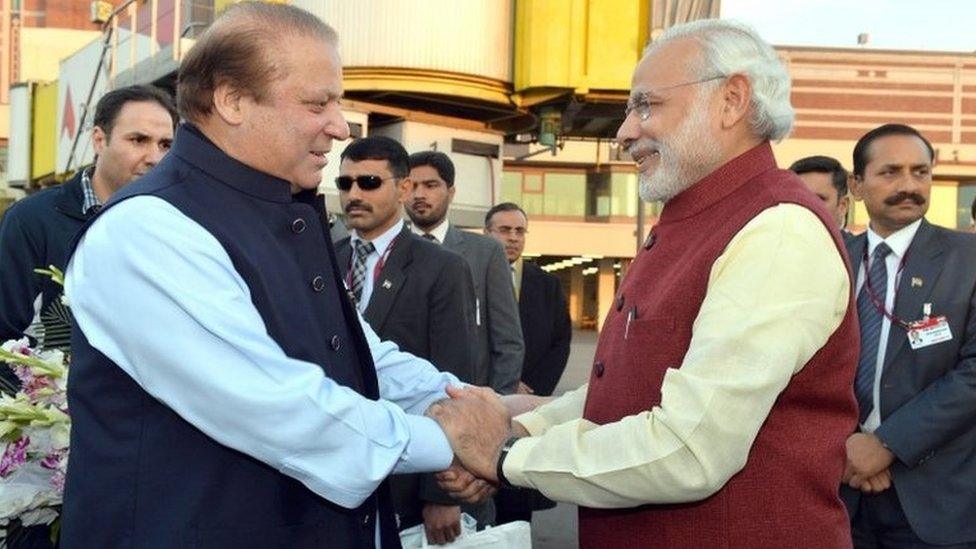
The warning from Modi follows escalating tensions between India and Pakistan, which have remained a focal point of international diplomacy in recent years. Despite these rising tensions, the announcement of a ceasefire between the two nations has been hailed as a significant development. However, the question of who deserves credit for brokering this peace remains a contentious issue.
The Trump administration, in a bid to influence regional dynamics, has claimed credit for facilitating the ceasefire agreement. Yet, India has refuted these claims, stating that the ceasefire was the result of Pakistan's direct outreach to India on May 10, requesting a cessation of hostilities. This interaction marked a shift from the usual diplomatic back-and-forth and was seen as a pragmatic move on Pakistan's part.
The diplomatic exchange and ceasefire call are reflective of a broader strategic shift. Both nations, which have engaged in multiple military skirmishes and diplomatic standoffs over the years, appear to be seeking a respite from the relentless cycle of hostility. However, India has made it clear that it will not tolerate provocations, and its military readiness remains a point of emphasis in the ongoing tensions.
India's response to any Pakistani action has been consistent, with top government officials reiterating that the nation will not hesitate to escalate its response if necessary. The Indian government has been under intense pressure to maintain a robust stance against Pakistan, particularly from its national security apparatus and military leadership.
The ceasefire, which has been welcomed by some international players, is seen as an attempt to stabilise the region. Yet, experts remain sceptical about its long-term viability. Given the entrenched historical animosities and the ongoing security concerns, it is unclear whether this temporary pause in hostilities will translate into a lasting peace or merely serve as a brief interlude in a long-standing conflict.
While the ceasefire appears to have eased immediate tensions, it has not resolved the underlying issues between the two nations, including the Kashmir dispute, cross-border terrorism, and other geopolitical concerns. These deep-rooted issues have kept the two countries on edge, and while diplomacy may offer short-term relief, the broader context remains volatile.
Despite the ceasefire agreement, India’s stance towards Pakistan remains firm. New Delhi has emphasised that it will not back down from its position on key security matters, particularly the fight against terrorism. The Indian government has called for the international community to recognise the persistent threats posed by Pakistan-based militant groups and the need for accountability.
Pakistan’s motivations for seeking the ceasefire are open to interpretation. While some analysts view it as a tactical move to alleviate military pressure, others suggest it is an effort to improve its international image amidst mounting challenges, both domestically and on the global stage. The ceasefire announcement, though diplomatically significant, comes at a time when Pakistan faces multiple internal challenges, including economic difficulties, political instability, and the growing threat of extremist groups.
At the same time, India’s military has made it clear that it remains prepared for any eventuality. The Indian armed forces, bolstered by enhanced defence capabilities and intelligence infrastructure, continue to maintain a high level of alertness along the border. With tensions simmering, India has stressed that it will not hesitate to respond decisively to any provocation.
The involvement of external powers like the United States adds another layer of complexity to the situation. While the Trump administration has sought to take credit for brokering the ceasefire, India’s diplomatic response has been more cautious. Indian officials have reiterated that any peace agreement must be based on Pakistan’s actions rather than external mediation. This highlights India's preference for direct dialogue and engagement with Pakistan, despite the longstanding challenges in their relationship.
Experts are divided on whether the ceasefire will lead to a broader thaw in relations. While some believe it could pave the way for more substantial negotiations, others argue that it is little more than a tactical pause. The lack of trust between the two nations, compounded by historical grievances, makes any lasting resolution seem elusive.
The strategic implications of the ceasefire also raise concerns about the broader security dynamics in the region. Both India and Pakistan are nuclear-armed states, and the potential for miscalculation or escalation remains high. Analysts have warned that even a temporary lull in hostilities does not guarantee long-term stability, especially given the deeply entrenched nature of the conflicts at play.
India’s approach to Pakistan is informed by a combination of military readiness and diplomatic engagement. The government has made it clear that it will continue to prioritise national security while also seeking avenues for peace when possible. Modi’s statements on a forceful response to any provocation reflect the government's position on maintaining a tough stance when necessary, while also leaving the door open for diplomatic dialogue.
